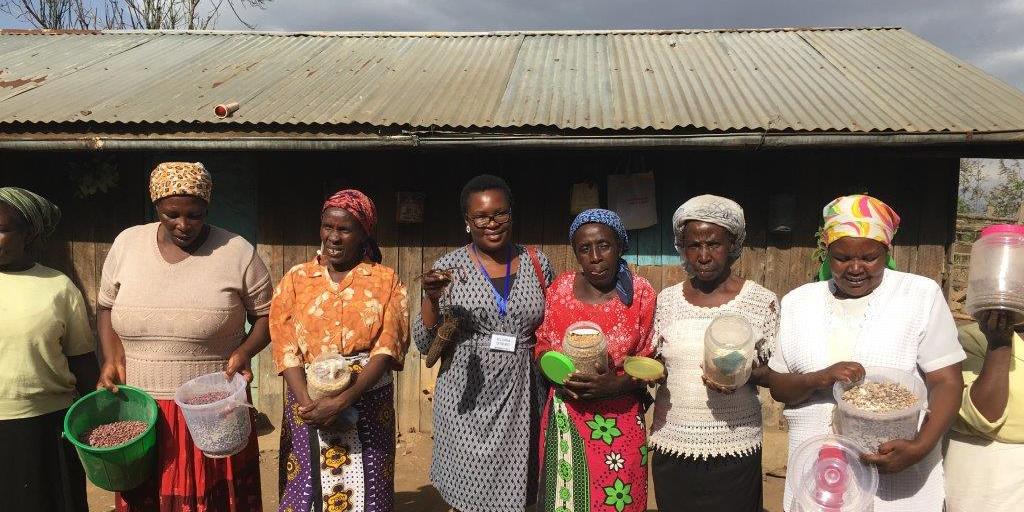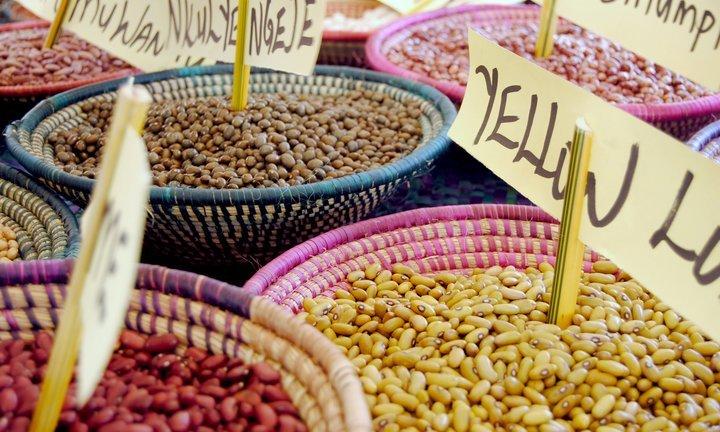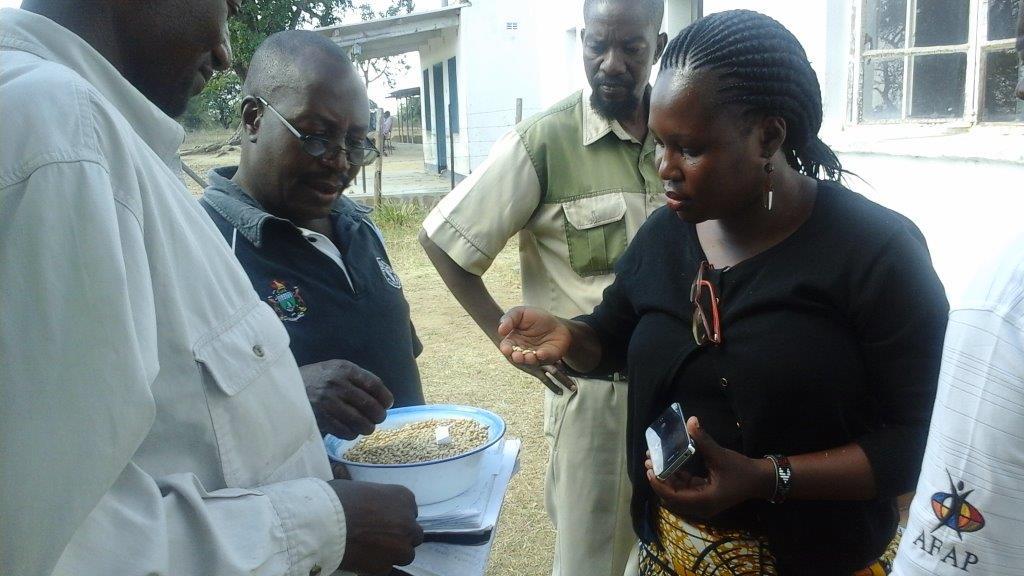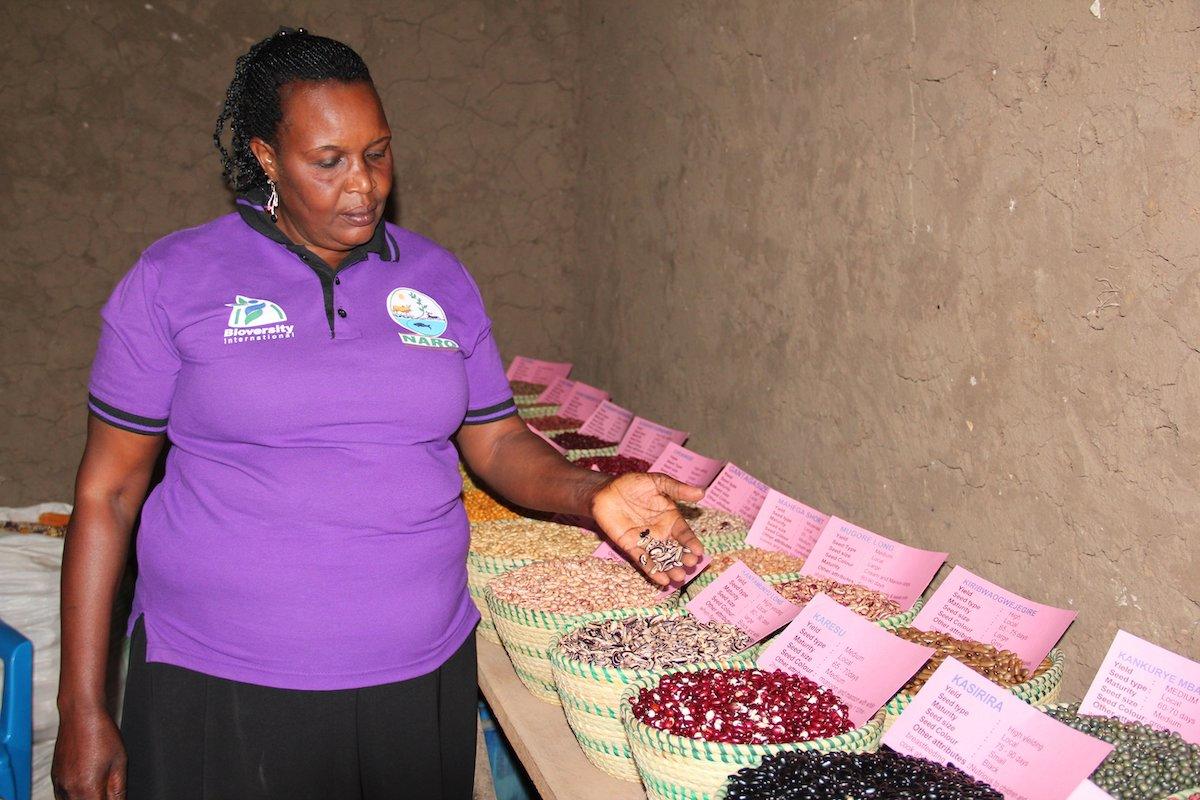Blog Why we save seeds in Uganda

Scientist Gloria Otieno details the Alliance’s longstanding work supporting community seed banks in Uganda.
Saving seeds, safeguarding agro-biodiversity
Seed remains the most vital input in food production and consequently, access to seeds is crucial in ensuring farmers’ food security and livelihoods.
Farmers in Africa have engaged in seed saving practices for millennia through seed selection, storage, conservation and identification of useful traits, generating knowledge that has passed down through many generations.
Having worked with communities in Kenya, Uganda and Tanzania since 2013, I’ve observed that unfortunately climate change, pests and diseases are drastically affecting crop production and leading to loss of precious genetic diversity. In addition, lack of capacity in management and conservation of local genetic resources poses a major challenge.
A promising practice that can facilitate the conservation of agro-biodiversity at the community level is the establishment of seed banks. In recent years this practice has grown in momentum; such as when groups of farmers have come together to set up the Kiziba community seed bank in Uganda.

Bean varieties in Uganda. Credit: Bioversity International/I.Lopez-Noriega
Kiziba is one of ten seed banks established over a decade ago through the collaboration of the Alliance of Bioversity International and CIAT and the National Agricultural Research Organization’s (NARO) Plant Genetic Resources Centre. The seed bank currently serves over 2,000 farmers in Sheema district and acts as a learning platform for knowledge sharing and capacity development. Through related capacity development activities, seven additional seed banks have been established across Uganda (Rubaya, Masaka, Nakosongola, Nakaseke and Hoima), and another two within Sheema district. The seed banks mainly conserve local varieties of beans as well as finger millet, groundnuts, sorghum, sesame and traditional leafy vegetables.
For example, the Kiziba seed bank contains 69 varieties of beans. Beans are a major source of protein in this region, especially in Uganda and Rwanda, which have the highest per capita consumption in the world and are secondary centers of bean diversity.
Importance of Community Seed Banks
To ensure that farmers have sufficient planting material, the Kiziba seed bank distributes over four tonnes of seed per season. However, community seed banks are not just a useful tool to store seed for the next planting season. They are also vital in the conservation of agro-biodiversity in-situ, which ensures continuous adaptation of genetic resources to the ever-changing environment.
Seed banks’ diverse varieties have differing traits and characteristics that help with the management of pests and diseases. Likewise, varieties mature at different times, offering a more prolonged period of household food security and improved nutrition. Thus, seed banks can improve resilience whilst boosting food production and nutrition. Additionally, they act as information centers by providing farmers with a platform for sharing seeds and related indigenous knowledge for their use, management and conservation.
Through community seed banks, the Alliance has collaborated with National Agricultural Research organizations and national gene banks to re-introduce lost diversity, introduce new diversity, and test and disseminate newly developed varieties through participatory varietal testing and selection methodologies.

Visiting a seed bank in UMP Zimbabwe, 2016. Credit: Bioversity International
Capacity Development and Women’s Empowerment
Likewise, community seedbanks play an important role in fostering women’s participation in the conservation, management and use of agro-biodiversity by recognizing women’s role as custodians of biodiversity and main providers of household food security.
In Kiziba, we have helped turn around the lives of many women, building their capacity with good agricultural practices such as proper tillage, planting and weeding, pest and disease management through use of bean diversity and on-farm conservation of local bean diversity. This has helped improve their livelihoods as well as household food security and nutrition.
I am happy to have lent technical knowledge to these efforts, especially in linking the community seedbank with the national genebank (the Plant Genetic Resources Centre in NARO-Entebbe). Over the years, farmers have received training from the Seed Inspection services of the Ministry of Agriculture Fisheries and Animal Husbandry (MAAIF) on various aspects of good agricultural practices, seed production and seed quality assurance. As a result, the farmers registered a seed cooperative, which is the “business arm” of the seed bank. Joy Mugisha, one of the participating farmers, explains:
“Through the seed cooperative, farmers produce and sell seven varieties of beans under quality declared class of seed (QDS). With a membership of over 200 farmers, the cooperative sales currently amount to an average of three tonnes of seed, with each farmer earning an average of USD $213 per season.”

Joy Mugisha in her home seed bank. Credit: Bioversity International/J.Turyatemba
Joy’s journey (a previous blog explains why she has become known as the “bean encyclopedia”) exemplifies the ripple effect of our work. After working at the seed bank and receiving training, Joy has established her own seed bank at home where she is conserving about 60 varieties of beans. She has also become a trainer to share her knowledge on good agricultural practices with other farmers.
Science has huge potential to empower women; this is why I encourage female students to pursue scientific work. I like to tell them, “Science helps us to understand the world and find answers to problems facing the world today. When you pursue science you not only contribute to solving problems, but through innovations, you also improve humanity”.
Wide recognition
The seed bank and its members have been recognized both nationally and internationally for promoting Farmers’ rights under Article 9 of the International Treaty for Plant Genetic Resources for Food and Agriculture (ITPGRFA), which includes the right to save, sell and exchange seeds and protect their indigenous knowledge.

Gloria with women seed savers in Kenya. Credit: Bioversity International
About the author
Gloria Otieno joined Bioversity International 8 years ago, now a part of the Alliance of Bioversity International and CIAT. She was a Dutch Associate Expert under the Genetic Resources Policy Initiative (GRPI) Project II, focusing on the implementation of the International Treaty for Plant Genetic Resources for Food and Agriculture (ITPGRFA) and climate resilient seed systems. She later joined the policy unit as an Associate Scientist – Genetic Resources and Food Security Policy where she has focused on resilient seed systems and related seed policies; implementation of IT and farmers’ rights; and conservation through community seed banking. She has an MSc. In Agricultural Development (Agricultural Economics and Rural Development) and a PhD in Development Economics. She has worked in Benin, Madagascar, Zimbabwe, Zambia, Tanzania, Kenya, Uganda and Rwanda.
